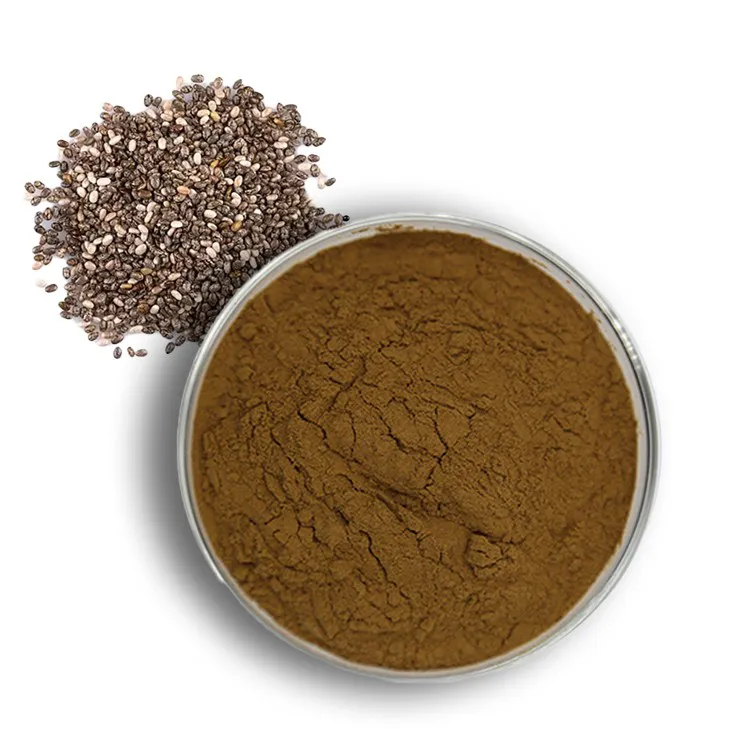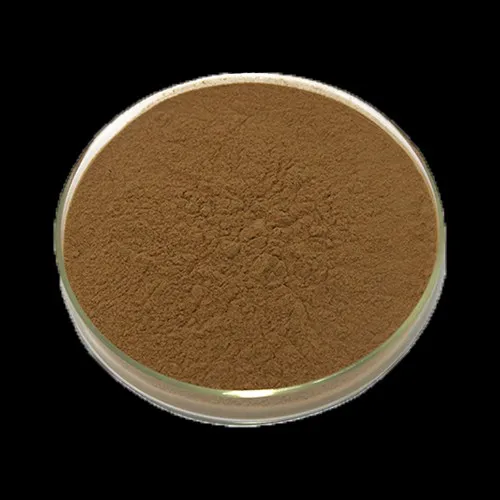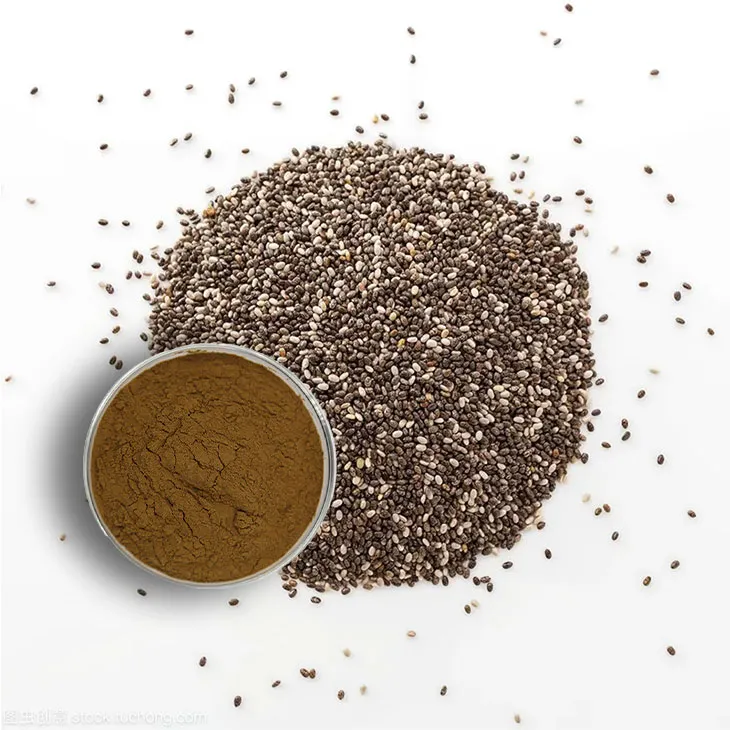- 0086-571-85302990
- sales@greenskybio.com
5 Benefits of Chia Seed Powder + Dosage, Side Effects
2024-11-13

1. Introduction
Chia seeds have been a staple in the health and wellness community for quite some time. However, Chia Seed Powder is gaining even more popularity due to its convenience and versatility. In this article, we will explore the five main benefits of Chia Seed Powder, discuss the appropriate dosage, and also touch on any potential side effects.

2. The Five Benefits of Chia Seed Powder
2.1 High in Nutrients
Chia seed powder is packed with essential nutrients. It is a rich source of omega - 3 fatty acids, which are crucial for heart health. These fatty acids help in reducing inflammation in the body and can also improve brain function. Additionally, chia seed powder contains fiber, protein, vitamins such as vitamin B complex, and minerals like calcium, magnesium, and zinc.
2.2 Aids in Digestion
The high fiber content in chia seed powder is beneficial for digestion. Fiber adds bulk to the stool, which helps in preventing constipation. It also feeds the good bacteria in the gut, promoting a healthy gut microbiome. This can lead to better absorption of nutrients from the food we eat and can also improve overall digestive health.
2.3 Helps in Weight Management
- Chia seed powder can be a great addition to a weight - loss diet. When consumed, it absorbs water and forms a gel - like substance in the stomach. This gel helps in making you feel full for longer periods, reducing the urge to snack between meals.
- Since it is relatively low in calories but high in fiber and protein, it provides a feeling of satiety without adding excessive calories to your diet.
2.4 Boosts Energy Levels
- The combination of complex carbohydrates, protein, and healthy fats in chia seed powder provides a slow and steady release of energy. This can be especially beneficial for those who need sustained energy throughout the day, such as athletes or people with an active lifestyle.
- Also, the nutrients in chia seed powder support the body's metabolic processes, which in turn helps in maintaining optimal energy levels.
2.5 Supports Heart Health
- As mentioned earlier, the omega - 3 fatty acids in chia seed powder are good for the heart. They can help in reducing bad cholesterol levels (LDL) and increasing good cholesterol levels (HDL).
- The fiber content also plays a role in heart health by helping to regulate blood pressure and reducing the risk of heart disease.

3. Dosage of Chia Seed Powder
- The appropriate dosage of chia seed powder can vary depending on various factors such as age, gender, and overall health. However, a general guideline is to start with a small amount, around 1 - 2 tablespoons per day.
- It is important to gradually increase the dosage to allow your body to adjust. Some people may be able to tolerate up to 3 - 4 tablespoons per day without any issues.
- When consuming chia seed powder, it is best to mix it with water, juice, or add it to smoothies, yogurt, or oatmeal. This helps in preventing any potential choking hazards as the powder can absorb a large amount of liquid and expand.

4. Side Effects of Chia Seed Powder
- While chia seed powder is generally safe for most people, there are some potential side effects to be aware of. One of the main concerns is the risk of choking. As the powder can absorb a lot of liquid and form a gel - like mass, it is important to consume it with enough fluid and chew it well if in a solid form.
- Some people may experience digestive discomfort such as bloating, gas, or diarrhea, especially if they consume too much chia seed powder at once or if their body is not used to the high - fiber content. In such cases, it is advisable to reduce the dosage and gradually increase it as the body adapts.
- Chia seed powder may also interact with certain medications. For example, if you are taking blood - thinning medications, the omega - 3 fatty acids in chia seed powder may increase the risk of bleeding. It is always important to consult your doctor before adding chia seed powder to your diet if you are on any medications.
5. Conclusion
Chia seed powder offers numerous health benefits, from providing essential nutrients to aiding in digestion, weight management, energy boost, and heart health. By following the appropriate dosage guidelines and being aware of the potential side effects, you can safely incorporate this superfood into your diet. Whether you are looking to improve your overall health or target specific health concerns, chia seed powder can be a valuable addition to your daily routine.
FAQ:
What are the five benefits of chia seed powder?
1. Rich in nutrients: Chia seed powder is packed with fiber, protein, omega - 3 fatty acids, vitamins, and minerals. These nutrients support overall health, including heart health, digestion, and muscle function.
2. High in fiber: It helps in promoting regular bowel movements, preventing constipation, and may also assist in weight management by providing a feeling of fullness.
3. Omega - 3 fatty acids: These are beneficial for heart health, reducing inflammation in the body, and may improve cognitive function.
4. Antioxidant properties: Chia seed powder contains antioxidants that can help protect the body against free radical damage, which is associated with various diseases and aging.
5. Blood sugar regulation: The fiber in chia seed powder can slow down the absorption of sugar, potentially helping in managing blood sugar levels.
What is the recommended dosage of chia seed powder?
The general recommended dosage of chia seed powder is about 1 - 2 tablespoons per day. However, this can vary depending on individual needs, such as dietary goals (e.g., for weight loss or general health maintenance) and overall health status. It's also important to start with a small amount and gradually increase the dosage to see how your body reacts.
Are there any side effects of chia seed powder?
Some possible side effects include digestive issues such as bloating, gas, or diarrhea, especially if consumed in large amounts or if a person is not used to a high - fiber diet. Additionally, chia seeds can absorb a lot of liquid, so not drinking enough water when consuming chia seed powder may cause discomfort in the digestive tract.
How can chia seed powder be incorporated into the diet?
Chia seed powder can be added to smoothies, yogurt, oatmeal, or baked goods. It can also be used to make chia pudding by mixing it with a liquid (such as milk or a plant - based alternative) and allowing it to sit until it thickens.
Is chia seed powder suitable for everyone?
While chia seed powder offers many health benefits, it may not be suitable for everyone. People with certain digestive disorders, such as diverticulitis or Crohn's disease, may need to be cautious when consuming chia seeds. Also, those who are allergic to other seeds may have an allergic reaction to chia seeds. It's always best to consult a healthcare provider before adding chia seed powder to your diet, especially if you have any underlying health conditions.
Related literature
- The Nutritional and Health Benefits of Chia Seeds"
- "Chia Seeds: A Comprehensive Review of Their Nutritional Profile and Potential Health Applications"
- "Dosage Considerations for Chia Seed Consumption: A Review"
- ▶ Hesperidin
- ▶ Citrus Bioflavonoids
- ▶ Plant Extract
- ▶ lycopene
- ▶ Diosmin
- ▶ Grape seed extract
- ▶ Sea buckthorn Juice Powder
- ▶ Fruit Juice Powder
- ▶ Hops Extract
- ▶ Artichoke Extract
- ▶ Mushroom extract
- ▶ Astaxanthin
- ▶ Green Tea Extract
- ▶ Curcumin
- ▶ Horse Chestnut Extract
- ▶ Other Product
- ▶ Boswellia Serrata Extract
- ▶ Resveratrol
- ▶ Marigold Extract
- ▶ Grape Leaf Extract
- ▶ New Product
- ▶ Aminolevulinic acid
- ▶ Cranberry Extract
- ▶ Red Yeast Rice
- ▶ Red Wine Extract
-
Panax Ginseng Leaf Extract
2024-11-13
-
Nettle Root Extract
2024-11-13
-
Saponin Extract
2024-11-13
-
Andrographis Paniculata Extract Powder
2024-11-13
-
Lemon Extract
2024-11-13
-
Aguaje Extract
2024-11-13
-
Bamboo Leaf extract
2024-11-13
-
Genistein
2024-11-13
-
Green Tea Extract
2024-11-13
-
Grapefruit Seed Extract Powder
2024-11-13





















